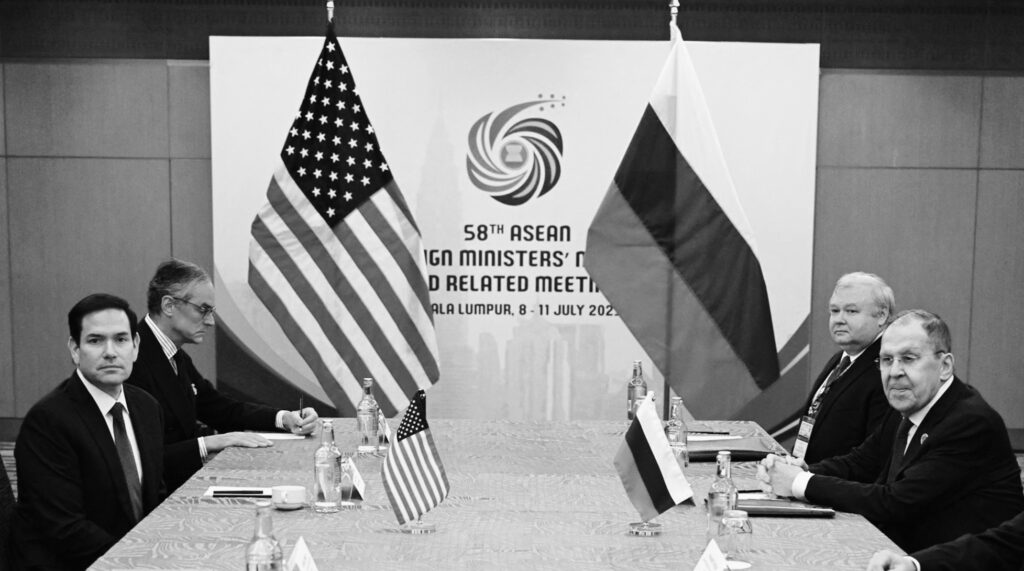Kuala Lumpur | 11 July 2025
TPO Staff | Agencies Input
As global diplomatic friction intensifies, US Secretary of State Marco Rubio is scheduled to meet Russian Foreign Minister Sergey Lavrov in Kuala Lumpur on Thursday, marking a pivotal moment for US-Russia relations amid escalating warfare in Ukraine and a flurry of trade-related confrontations in Southeast Asia.
The bilateral engagement, to take place on the sidelines of the ASEAN Regional Forum, comes at a time of growing concern over Moscow’s intensified aerial attacks on Ukraine and mounting doubts about Russian President Vladimir Putin’s intent toward any form of peace settlement.
Rubio’s meeting with Lavrov is part of his debut diplomatic tour through Asia—one that is increasingly overshadowed by broader geopolitical fault lines, including President Donald Trump’s controversial tariff threats against several Asian economies.
“This conversation with Lavrov will test the limits of what diplomacy can still accomplish in a global order rapidly slipping toward fragmentation,” a senior US official familiar with the talks told The Political Observer on condition of anonymity.
Return of US Military Aid to Ukraine
The US-Russia standoff gained renewed momentum this week when the White House resumed shipments of defensive weapons to Ukraine, reversing a temporary pause. The Pentagon initially halted supplies for an internal review of domestic munitions stockpiles—a move that had been widely interpreted as a sign of weakening US support for Kyiv.
President Trump, however, appeared to shift course during a Cabinet meeting on Tuesday.
“Putin is not treating human beings right. The war is killing too many people,” Trump said. “So we’re sending some defensive weapons to Ukraine, and I’ve approved that.”
The decision has drawn sharp reactions from Moscow, which has stepped up missile barrages across eastern Ukraine, signaling that diplomatic overtures may take a backseat to hard power tactics in the near term.
Tariffs Roil Rubio’s First Asia Visit
Even as Rubio prepares for tense discussions with Lavrov and Chinese Foreign Minister Wang Yi, economic disputes threaten to dominate the agenda. Trump’s administration this week issued a wave of new tariff notices to ASEAN member states, with some levies climbing as high as 40% on exports from countries like Laos and Myanmar.
The US President has warned that unless bilateral trade deals are signed by August 1, the punitive tariffs will take effect, potentially fracturing relations with long-standing allies in Southeast Asia. Vietnam and Singapore have already negotiated partial deals, but several others—including Malaysia, the Philippines, and Thailand—remain locked in tariff standoffs with Washington.
Speaking at a group meeting with ASEAN foreign ministers, Rubio sought to downplay the tariff tensions and reaffirm America’s Indo-Pacific commitment.
“The Indo-Pacific remains the centrepiece of our foreign policy. Distractions elsewhere won’t alter that,” Rubio said. “Our partnerships in this region are independent of any third-party approval—this is not about pleasing or defying any other actor.”
While Rubio avoided naming China directly, the subtext was unmistakable. His remarks followed a growing chorus from Southeast Asian leaders accusing both Washington and Beijing of weaponising trade to impose geopolitical leverage.
ASEAN Pushes Back
Malaysian Prime Minister Anwar Ibrahim, hosting this week’s ASEAN sessions, voiced strong opposition to the growing militarisation of trade relations.
“Global trade is now being used as a tool of coercion, not cooperation,” Anwar said in remarks widely interpreted as a rebuke of US tariffs. “ASEAN must build internal resilience and reduce dependency on external powers.”
Trump’s tariff policies have drawn fire even from US allies in the region. Trade officials from Japan and South Korea, both under pressure to revise procurement and tax regulations to suit US terms, have privately warned that Washington’s approach risks alienating strategic partners at a time when China’s influence continues to expand.
“Rubio is walking into a diplomatic minefield,” said Danny Russel, vice president of the Asia Society Policy Institute and a former assistant secretary of state. “His message on the China threat won’t land well with officials whose industries are being battered by tariffs.”
Russia, China, and Nuclear Diplomacy
The US has also continued to accuse Beijing of enabling Russia’s military-industrial complex by providing materials, components, and financial pathways that allow Moscow to continue building weapons used against Ukraine.
As he juggles the Ukraine war, trade friction, and strategic messaging, Rubio also signed a civilian nuclear energy memorandum with Malaysia, a precursor to a full 123 Agreement under US law. The deal would allow for future American investment in Malaysian nuclear infrastructure under strict regulatory conditions.
This move is seen as part of a broader US strategy to counterbalance China’s influence in the energy and infrastructure sectors across Southeast Asia. It also reflects Rubio’s intent to maintain a long-term diplomatic footprint in the region, despite the noise around tariffs and weapons shipments.
“What we’re seeing is a three-front diplomatic battle—against Russia in Ukraine, against China in the South China Sea, and now against a growing backlash over US economic policies,” said a diplomat from an ASEAN member state who declined to be named.
A New Diplomatic Crossroads
Rubio’s meeting with Lavrov, in particular, may determine whether any residual space for dialogue remains between Washington and Moscow. While expectations are low, observers note that direct high-level contact has been rare in recent months, and even a brief exchange could set the tone for G20 diplomacy later this year.
As regional and global power plays continue to unfold in Malaysia, the ASEAN summit has become a stage not only for official policy statements, but for deeper recalibrations of alliances, trust, and balance in a world where multilateralism is increasingly under siege.
For authoritative analysis on global diplomacy and strategic affairs, follow The Political Observer at politicalobserver.in
© The Political Observer 2025. All rights reserved.



